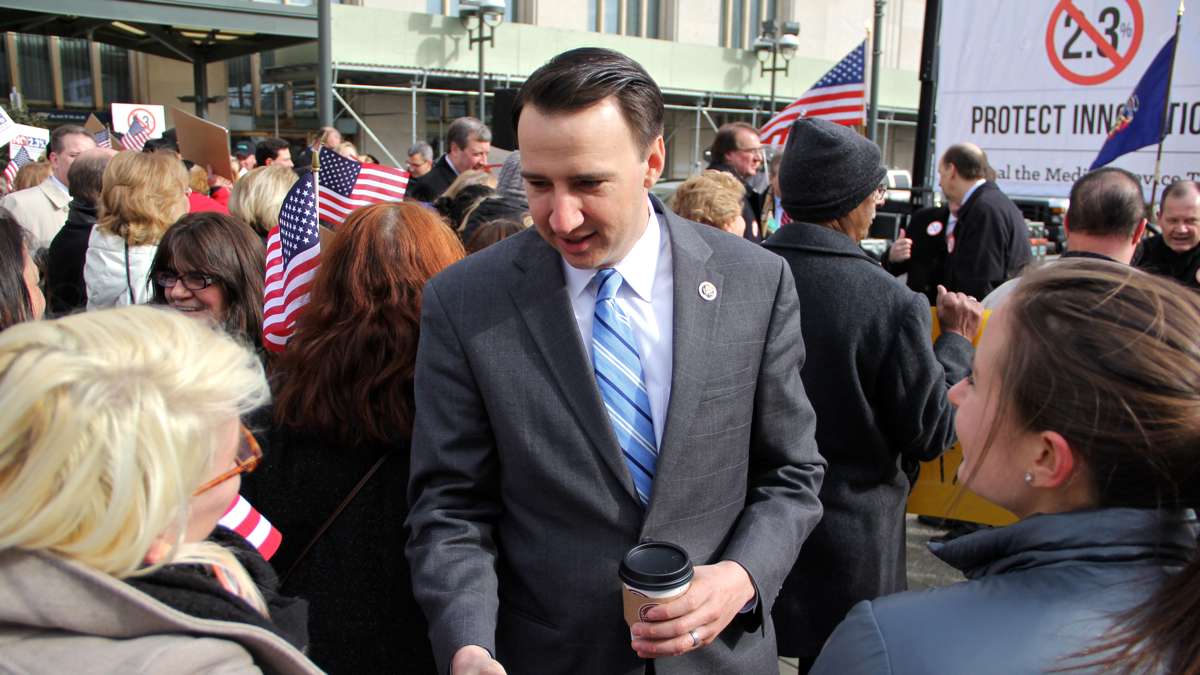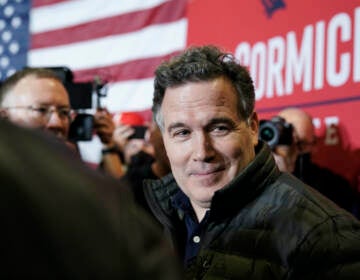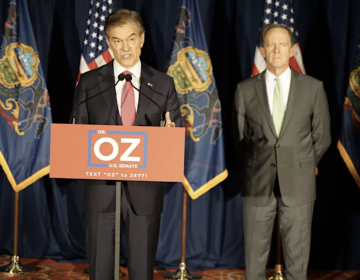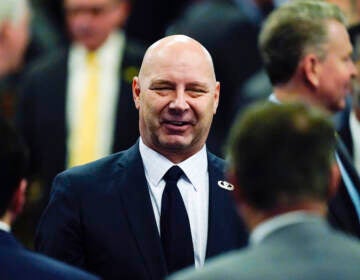While nation watched Kavanaugh hearings, House passed ‘Tax Cuts 2.0’
Running on tax cuts would normally unite Republicans, but 2018 is not turning out to be a normal year.

U.S. Rep. Ryan Costello, who represents a suburban area west of Philadelphia, voted in favor of the "Tax Cut 2.0" legislation. But he sympathized with GOP colleagues in states where a permanent $10,000 cap on state and local tax deductions will be a hardship. (Emma Lee/WHYY)
Running on tax cuts would normally unite Republicans, but 2018 is not turning out to be a normal year.
U.S. Rep. Ryan Costello, who decided not to run for another term representing his district in the suburbs west of Philadelphia, said that gambit won’t work everywhere.
“The political messaging on that would be effective for a lot of Republicans, but it would be a wrinkle for members in tricky spots,” he said.
Costello said he was especially thinking about his Republican friends across the Delaware River.
“I just worry about people in New Jersey. How are you going to vote for it if you’re in New Jersey or New York in a tough race?” he said.
His question was spot on. While the nation was riveted on the U.S. Senate Judiciary Committee hearings involving Supreme Court nominee Brett Kavanaugh, the House approved what’s referred to as “Tax Cuts 2.0.” The legislation makes many of the tax cuts championed by President Donald Trump permanent.
Costello voted for it, but four of the GOP members from New Jersey voted “no.”
Many of those Garden State lawmakers drew a line in the sand or maybe in the SALT — that’s Washington shorthand for those state and local taxes that are no longer fully deductible.
U.S. Reps. Frank LoBiondo, Leonard Lance, Rodney Frelinghuysen and Chris Smith all voted against the bill.
LoBiondo, who’s retiring, and Lance, who’s in the midst of a tough re-election bid, both opposed a permanent cap of $10,000 on deducting state and local taxes.
South Jersey U.S. Rep. Tom MacArthur, the only GOP member from the Garden State to vote for the original tax law, reaffirmed his position with another “yes” vote. Another tax package is essential, he said.
“There’s some cleanup after the initial tax bill,” he said. “The bill came together at the end with a lot of changes, and then, in the aftermath, we see some things that are less clear than they need to be.”
Heating and air conditioning contractors are among those who have complained to him because they can’t write off the costs of their equipment as before. And while MacArthur said he wanted to make a few changes to address some of those issues, he said the main part of the bill is to make permanent the new tax brackets and those tax cuts.
“Which I wanted to do in the first place I think many of us did,” he said.
‘Marriage penalty’ remains unchanged
And even though MacArthur has defended the $10,000 limit on state and local tax deductions, he attempted to offer a twist — a plan to make the deduction $10,000 per person despite marital status. The current law unintentionally encourages couples not to marry because two people living together can each deduct $10,000, he said.
But then, “they get married and they lose half of it. That’s a marriage penalty in my view, and so I’ve proposed eliminating that penalty,” MacArthur said.
However, that change was not part of the legislation that passed the House.
The House tax debate is also trickling over into the Senate campaigns. U.S. Rep. Lou Barletta, Pennsylvania’s Republican candidate for U.S. Senate, said he’s glad his party leaders in the House are focusing on taxes this fall.
“Realize that this isn’t something that we should just do and forget about. As the economy changes, we can tweak it and make it better,” he said. “We can always go back.”
What’s more, making the new tax rates permanent will tie Democrats’ hands, Barletta said.
“Making it permanent sends a message that, for anybody to undo it, for the Democrats to undo it, I don’t think it would be too popular,” he said.
Barletta’s Democratic opponent sees it quite differently. U.S. Sen. Bob Casey said the GOP tax debate shows that party’s priorities.
“They seem to want to give more to the wealthy,” he said. “I think the top 1 percent this year is getting like $58 billion. Top 1 percent’s doing well. We should focus on the middle class. And if they want a conversation about that, I’d love to hear it.
“But they got a heck of a lot less than the top 1 percent, even when you do it by way of percentage, so I hope they’ll focus on the middle class for once,” Casey said.
Casey’s Pennsylvania colleague, Republican U.S. Sen. Pat Toomey, supports the effort, but he said it’s unlikely to pass the Senate.
“I’m very much in favor of it. It’s hard to see how we have the votes here to do it though,” Toomey said.
If the bill won’t pass the Senate, some Northeastern Republicans — at least without microphones around — question why they were forced to vote on the bill in the first place. They wonder if it will cost the GOP some of these competitive seats, without actually making the tax changes permanent.
WHYY is your source for fact-based, in-depth journalism and information. As a nonprofit organization, we rely on financial support from readers like you. Please give today.




